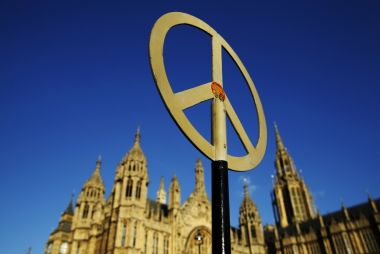Faith leaders call for worldwide ban on nuclear weapons

A group of 26 faith leaders have issued a joint call to end the development of nuclear weapons worldwide.
"Security policies based on the threat of the use of nuclear weapons are immoral and ultimately self-defeating," religious leaders from eight different faiths said in a joint statement today.
Their opposition to nuclear weapons has been issued ahead of the Nuclear Non-Proliferation Treaty (NPT) Review Conference, which begins at the end of April.
The president of the Baptist Union of Great Britain, Rev Dr Chris Ellis, the Archbishop of Wales Barry Morgan, and the moderator of the Church of Scotland General Assembly, Rt Rev John Chalmers, are among those who have supported the statement.
The signatories argue that "Any use of nuclear weapons would have devastating humanitarian consequences, be incompatible with International Humanitarian Law and violate the principle of dignity for every human being that is common to each of our faith traditions."
The distrust fostered by the threat of nuclear weapons, they say, undermines the trust required to tackle the world's biggest challenges, such as poverty and climate change.
The faith leaders also call for an end to the division between states that do and do not have nuclear weapons. They said the international community must "ensure that all states make good their commitment to negotiations on the universal, legally verifiable and enforceable elimination of nuclear weapons."
The Archbishop of Liverpool Malcolm McMahon, the president and vice-president of the Methodist Conference, Rev Kenneth G Howcroft and Gill Dascombe, and the moderator of the United Reformed Church, John Ellis have also signed.
They are joined by Maulana Shahid Raza of the British Muslim Forum and Lord Singh, director of the Network of Sikh Organisations and Anil Bhanot, director of the Hindu Council UK, among others.
The British government, along with the four other states with acknowledged nuclear capability, has so far resisted participating in negotiations that could lead to the elimination of nuclear weapons.
In December last year the Austrian government called on the international community to ban nuclear weapons, in keeping with the ban on chemical and biological weapons in international law. So far there are 40 other states that support this policy.











